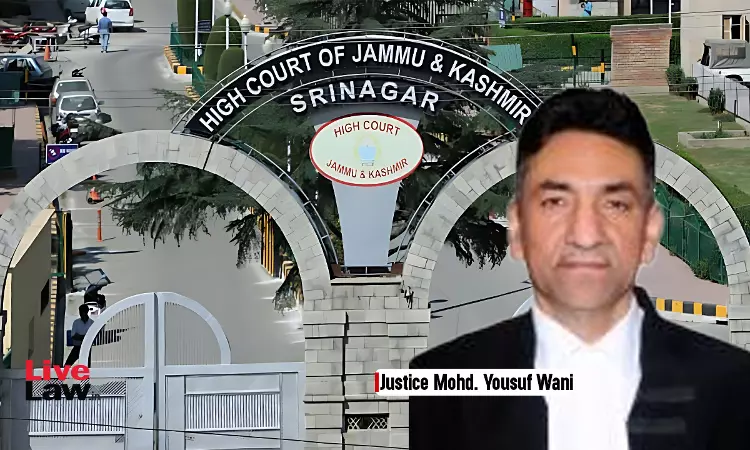- Home
- /
- High Courts
- /
- High Court of J & K and Ladakh
- /
- MV Act | Driver Licensed for...
MV Act | Driver Licensed for 'Transport Vehicle' Can Lawfully Drive Passenger Buses Without Separate Endorsement: J&K High Court
LIVELAW NEWS NETWORK
19 July 2025 1:34 PM IST
Clarifying the scope of driving licenses for commercial vehicles, the High Court of Jammu & Kashmir and Ladakh has held that a driver holding a valid licence to drive a "transport vehicle" is competent to operate both heavy goods vehicles and passenger carrying vehicles without the need for a separate Public Service Vehicle (PSV) endorsement.A bench of Justice Mohammad Yousuf Wani, ...
Clarifying the scope of driving licenses for commercial vehicles, the High Court of Jammu & Kashmir and Ladakh has held that a driver holding a valid licence to drive a "transport vehicle" is competent to operate both heavy goods vehicles and passenger carrying vehicles without the need for a separate Public Service Vehicle (PSV) endorsement.
A bench of Justice Mohammad Yousuf Wani, declared that post the 1994 amendment to the Motor Vehicles Act, 1988, all commercial vehicles, including goods and passenger vehicles, are unified under the single category of "transport vehicle." It was held:
“What is deduced from the analysis of the definitions... is that every heavy goods vehicle is a goods carriage, whereas a transport vehicle includes within its definition a public service vehicle as well as a goods carriage. Thus a passenger carrying vehicle i.e., a public service vehicle as also a heavy goods vehicle i.e., a goods carriage, fall within the definition of a 'transport vehicle'.”
These clarifications came in an appeal filed by National Insurance Company Ltd. under Section 173 of the Motor Vehicles Act, 1988, challenging the Award passed by the Motor Accidents Claims Tribunal (MACT), Jammu.
Assailing the award the appellant-insurer had contended that the driver of the offending vehicle held a license to drive only "Heavy Goods Vehicle" and was therefore not authorized to drive a passenger vehicle involved in the accident
The Insurance Company further argued that the Tribunal erred in holding it liable under the policy when the driver was allegedly in violation of licensing terms. Additionally, the appellant challenged the rate of interest awarded by the Tribunal at 7.5% per annum, terming it excessive given the contemporary banking rates.
Rejecting all contentions raised by the appellant, Justice Wani upheld the Tribunal's award, stating that it “does not admit of any interference as the same appears to have been passed in accordance with law.” Justice Wani observed that the issues framed, particularly Issue No. 3 concerning the validity of the driver's licence, were adjudicated correctly by the MACT.
The pivotal legal question before the Court was whether a driver licensed to drive a “Heavy Goods Vehicle” is also qualified to drive a “Passenger Service Vehicle.” To answer this, the Court undertook a detailed examination of the definitions under Section 2 of the Motor Vehicles Act, 1988.
Referring to Sections 2(14), 2(16), 2(35), and 2(47), the Court explained that both heavy goods vehicles and passenger carrying vehicles fall under the umbrella of "transport vehicles".
The Court emphasized that as per the amended Section 10(2) of the Motor Vehicles Act (effective from 14.11.1994), driving licences for all commercial vehicles whether goods or passenger are now issued under the unified category of “transport vehicle”. Emphasising that no further endorsement is required to drive one or the other, the court pointed out that the accident in this case had occurred in 2007, well after the amendment came into force.
The Court categorically held,
“Therefore, any person who was holding a driving license authorizing him to drive a particular type of commercial vehicle would automatically be eligible to drive any other type of commercial vehicle, meaning thereby that a driver holding a driving license to drive a heavy goods vehicle would be competent to drive a passenger carrying vehicle.”
The Court also addressed the appellant's reliance on the judgment National Insurance Co. Ltd. vs. Bashir Ahmed Chopan (2012), wherein it was held that PSV endorsement was necessary. However, Justice Wani dismissed this precedent as per incuriam, observing,
“The ratio laid down in the said case is per incuriam and not a binding precedent because it seems that the provisions referred to hereinbefore were not brought to the notice of the Court... Even otherwise also, the said judgment has been passed without taking note of the binding precedent of the judgment delivered by a Division Bench of this Court in National Insurance Co. Ltd. vs. Mohd Sadiq Kuchay (2008), wherein it has been held that PSV endorsement... is not necessary.”
Justice Wani further cited his concurrence with recent rulings of the Coordinate Benches in New India Assurance Co. Ltd vs. Jagjeet Singh (2023) and Oriental Insurance Co. vs. Nirmala Devi (2024), where similar views had been upheld regarding the scope of commercial driving licences.
On the other grounds raised by the appellant particularly the rate of interest on the compensation amount the Court found no merit. “The appeal seems to be devoid of any merit and is, accordingly, dismissed,” Justice Wani concluded.
Case Title: National Insurance Co Vs Naresh Kumar
Citation: 2025 LiveLaw (JKL) 281



